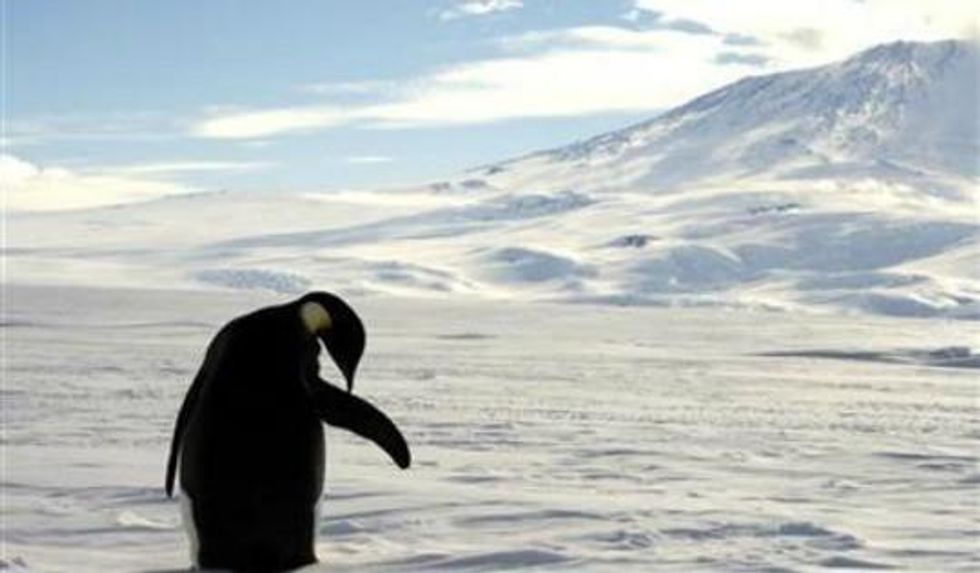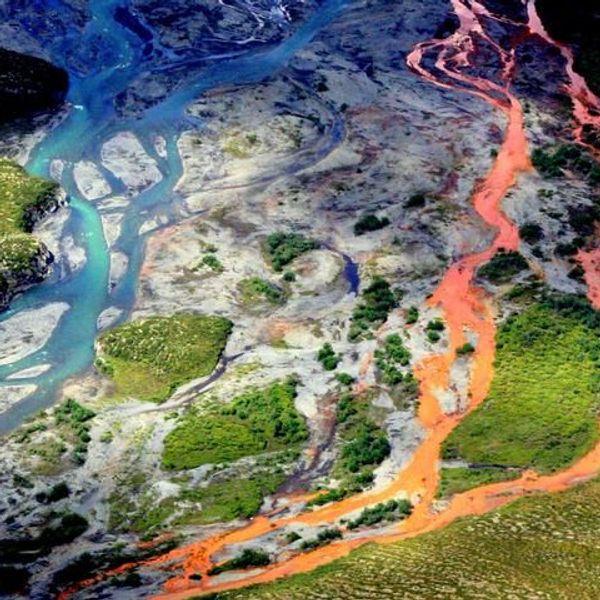Climate Change Means Death for Penguins and Their Babies: Scientists
Two separate studies show penguins' plight a direct cause of climate change

According to two groups of researchers who published separate reports in the journal PLOS ONE on Wednesday, a combination of extreme rainstorms and heatwaves are killing off Magellanic penguin chicks in Argentina, while changing sea ice patterns are making it harder for Adelie penguins in Antarctica to forage for food.
In the Argentina study, researchers showed over the course of 27 years that climate change was the root cause on average of 7% of increasing chick deaths. However, on some years the average shot up to between 43% to 50%.
"We're going to see years where almost no chicks survive if climate change makes storms bigger and more frequent during vulnerable times of the breeding season, as climatologists predict," said Dr. Ginger Rebstock, from the University of Washington, from the Argentina study.
"It's the first long-term study to show climate change having a major impact on chick survival and reproductive success," said lead author Dee Boersma, a biology professor at the University of Washington.
"Penguins are really the ocean's sentinels," said P. Dee Boersma. Sea birds, mammals, and people are also at risk. "They are telling us that we'd better start paying attention to climate change because penguins are dying from heat and these increased storms. At the same time we're starting to see increased numbers of people die from these same sorts of things. So these penguins are really the canary in the coal mine."
Meanwhile, in Antarctica, where the decline of the penguin has been well documented, scientists showed data ranging 13 years that reveals Adelie penguins are no longer able to gather adequate food due to increasing irregular ice patterns, a side effect of the changing climate.
The uncanny breaking off of giant icebergs has "encroached on the penguins' foraging grounds in the Ross Sea," as Agence France-Presse reports, "dramatically" reducing penguins' access to food.
"If the frequency of such extreme events increases, then it will become very hard to predict how penguin populations will buffer future sea ice changes," said lead researcher Dr. Amelie Lescroel, from the Center d'Ecologie Fontionnelle et Evolutive in France.
______________________
An Urgent Message From Our Co-Founder
Dear Common Dreams reader, The U.S. is on a fast track to authoritarianism like nothing I've ever seen. Meanwhile, corporate news outlets are utterly capitulating to Trump, twisting their coverage to avoid drawing his ire while lining up to stuff cash in his pockets. That's why I believe that Common Dreams is doing the best and most consequential reporting that we've ever done. Our small but mighty team is a progressive reporting powerhouse, covering the news every day that the corporate media never will. Our mission has always been simple: To inform. To inspire. And to ignite change for the common good. Now here's the key piece that I want all our readers to understand: None of this would be possible without your financial support. That's not just some fundraising cliche. It's the absolute and literal truth. We don't accept corporate advertising and never will. We don't have a paywall because we don't think people should be blocked from critical news based on their ability to pay. Everything we do is funded by the donations of readers like you. Will you donate now to help power the nonprofit, independent reporting of Common Dreams? Thank you for being a vital member of our community. Together, we can keep independent journalism alive when it’s needed most. - Craig Brown, Co-founder |
Jacob Chamberlain is a former staff writer for Common Dreams. He is the author of Migrant Justice in the Age of Removal. His website is www.jacobpchamberlain.com.

According to two groups of researchers who published separate reports in the journal PLOS ONE on Wednesday, a combination of extreme rainstorms and heatwaves are killing off Magellanic penguin chicks in Argentina, while changing sea ice patterns are making it harder for Adelie penguins in Antarctica to forage for food.
In the Argentina study, researchers showed over the course of 27 years that climate change was the root cause on average of 7% of increasing chick deaths. However, on some years the average shot up to between 43% to 50%.
"We're going to see years where almost no chicks survive if climate change makes storms bigger and more frequent during vulnerable times of the breeding season, as climatologists predict," said Dr. Ginger Rebstock, from the University of Washington, from the Argentina study.
"It's the first long-term study to show climate change having a major impact on chick survival and reproductive success," said lead author Dee Boersma, a biology professor at the University of Washington.
"Penguins are really the ocean's sentinels," said P. Dee Boersma. Sea birds, mammals, and people are also at risk. "They are telling us that we'd better start paying attention to climate change because penguins are dying from heat and these increased storms. At the same time we're starting to see increased numbers of people die from these same sorts of things. So these penguins are really the canary in the coal mine."
Meanwhile, in Antarctica, where the decline of the penguin has been well documented, scientists showed data ranging 13 years that reveals Adelie penguins are no longer able to gather adequate food due to increasing irregular ice patterns, a side effect of the changing climate.
The uncanny breaking off of giant icebergs has "encroached on the penguins' foraging grounds in the Ross Sea," as Agence France-Presse reports, "dramatically" reducing penguins' access to food.
"If the frequency of such extreme events increases, then it will become very hard to predict how penguin populations will buffer future sea ice changes," said lead researcher Dr. Amelie Lescroel, from the Center d'Ecologie Fontionnelle et Evolutive in France.
______________________
Jacob Chamberlain is a former staff writer for Common Dreams. He is the author of Migrant Justice in the Age of Removal. His website is www.jacobpchamberlain.com.

According to two groups of researchers who published separate reports in the journal PLOS ONE on Wednesday, a combination of extreme rainstorms and heatwaves are killing off Magellanic penguin chicks in Argentina, while changing sea ice patterns are making it harder for Adelie penguins in Antarctica to forage for food.
In the Argentina study, researchers showed over the course of 27 years that climate change was the root cause on average of 7% of increasing chick deaths. However, on some years the average shot up to between 43% to 50%.
"We're going to see years where almost no chicks survive if climate change makes storms bigger and more frequent during vulnerable times of the breeding season, as climatologists predict," said Dr. Ginger Rebstock, from the University of Washington, from the Argentina study.
"It's the first long-term study to show climate change having a major impact on chick survival and reproductive success," said lead author Dee Boersma, a biology professor at the University of Washington.
"Penguins are really the ocean's sentinels," said P. Dee Boersma. Sea birds, mammals, and people are also at risk. "They are telling us that we'd better start paying attention to climate change because penguins are dying from heat and these increased storms. At the same time we're starting to see increased numbers of people die from these same sorts of things. So these penguins are really the canary in the coal mine."
Meanwhile, in Antarctica, where the decline of the penguin has been well documented, scientists showed data ranging 13 years that reveals Adelie penguins are no longer able to gather adequate food due to increasing irregular ice patterns, a side effect of the changing climate.
The uncanny breaking off of giant icebergs has "encroached on the penguins' foraging grounds in the Ross Sea," as Agence France-Presse reports, "dramatically" reducing penguins' access to food.
"If the frequency of such extreme events increases, then it will become very hard to predict how penguin populations will buffer future sea ice changes," said lead researcher Dr. Amelie Lescroel, from the Center d'Ecologie Fontionnelle et Evolutive in France.
______________________

